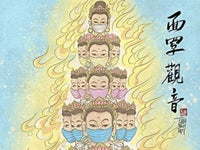Hospital ministry under coronavirus lockdown
contributed by Geronimo Cristobal, 6 August 2020
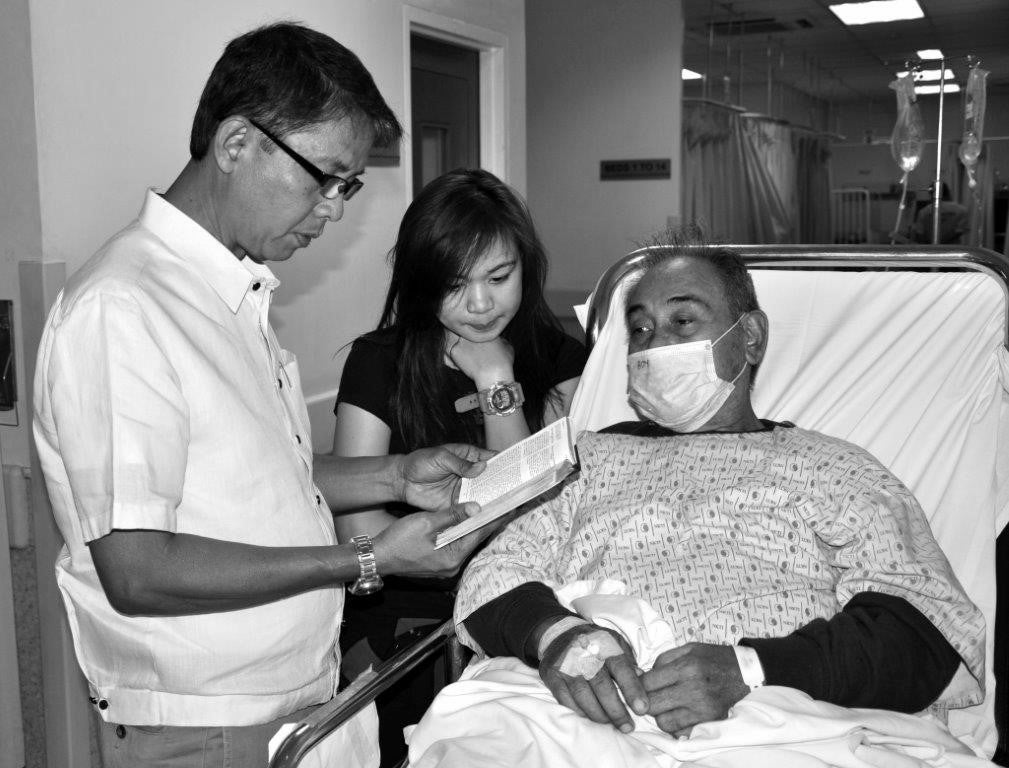
Fig. 1. Pastor Gerry during his spiritual counseling rounds at the Emergency Room in 2016. Photo: NKTI.gov.ph/ Public domain
My father, Gerry, is a veteran missionary for a small local Christian congregation in the Philippines that has held Sunday service at a hospital for the last fourteen years. Assisted by my mother Beth, he has done missionary work in various workplaces since the 1980s. His current post in the Palliative Care Unit, an office specializing in care to the chronically and terminally ill of the National Kidney and Transplant Institute (NKTI) in Metro Manila, puts him in proximity with frontline workers and patients during the current COVID-19 pandemic.
When President Duterte issued a lockdown of Metro Manila on March 16, 2020, all religious activities were prohibited. Although regular Sunday services were interrupted, my father’s ministry to the patients continued.
During this period of lockdown, public transportation was suspended and only essential workers, which excluded religious workers, were permitted to use the roads. In order to continue with his visits to patients, he would need my sister, a medical doctor, to sit next to him in the car and show her professional license to policemen stationed at checkpoints.
Reading the story of a priest facing similar circumstances while ministering to the poor neighborhoods in Manila in the New York Times last month, I thought about how my father, an Evangelical pastor, has been doing similar work, but without the institutional support of a Church establishment. His experience at the NKTI is reflective of “microchurches” that have responded to the gaps in religious services to people who are either non-Catholic or too poor to affiliate with any religion. Based entirely on faith-based arrangements of mutual reciprocity, these microchurches rely on the private initiative of ministers like my father, who increasingly take on roles as social workers for the faithful. COVID-19 has revealed the institutional failures of many states in providing basic healthcare, let alone palliative care, which has become especially important in the current global pandemic.
Evangelical Christianity in the Philippines
Ever since I can remember, my parents, Gerry and Beth, both 64 years old now, had been missionaries. They do not work exclusively with a church ,nor had they affiliated with philanthropic organizations for their ministry. This reflects a general shift in the outlook of religious ministers in response to the public’s distrust of organized religions in the Philippines, which have relied on populist tactics to lure membership.
My father shares the view of microchurches sprouting in the metropolis that Evangelical Christianity had been corrupted by the dozen or so nationalized cults in the Philippines that have dominated the Protestant demographic in the last 40 years.
Unlike most Evangelical pastors, my parents maintained their professions: my father as a corporate manager for an industrial plant and my mother as a nurse in a hospital. They have made ministering to the poor their true work for the past 35 years (14 of those had been full time), even while raising a family of four children. In the early 1990s, the little Bible study group they started with a dozen non-Catholic families would result in the founding of the first Evangelical church in a small provincial town south of Manila where I was born in 1986, just a few months after the EDSA People Power Revolution. The success of the four-day popular revolt is credited to public calls of protest by Catholic religious leaders and a broad alliance of religious opposition to the Marcos dictatorship.
According to a study by John Miller published by the Asia Society, nearly 6% of the Filipino population are Protestant Christians, which is further subdivided into a wide variety of Pentecostal, Evangelical, and independent churches. As Evangelicals, my parents embraced a missionary culture that entailed moving from place to place, but in the last 14 years their work has become increasingly centered on developing microchurches in workplace environments.
In Metro Manila, it has been typical of many workplaces to demand employees to report even on traditional days of worship. This is especially true for hospital workers, as evident in a 2009 study by Warwick Anderson on the Philippine General Hospital which portrayed medical workers having notoriously long shifts with very rare days devoted to rest and relaxation. My parents believe that overworked professionals constitute a neglected target group in missionary work.
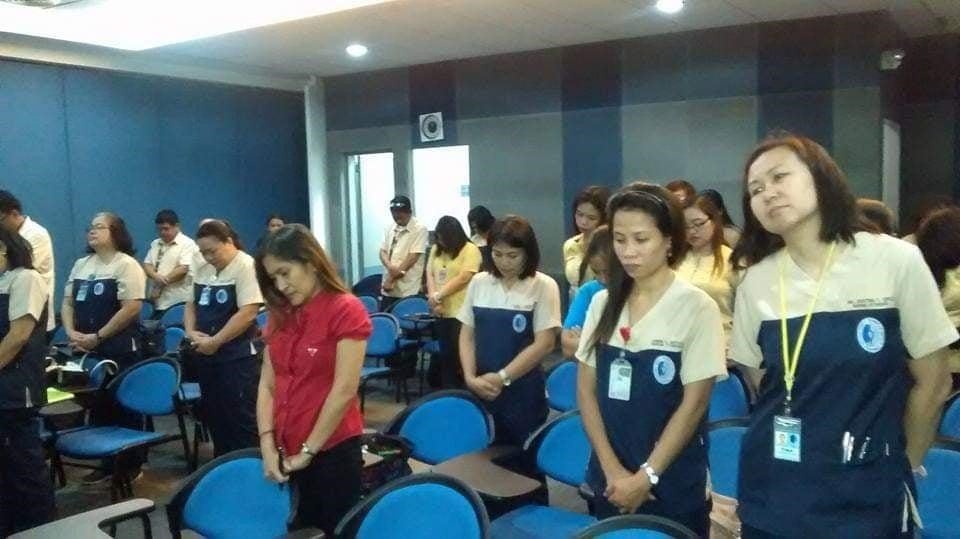
Fig. 2 Hospital workers are led to prayer by Pastor Gerry, Photo: NKTI, 2019
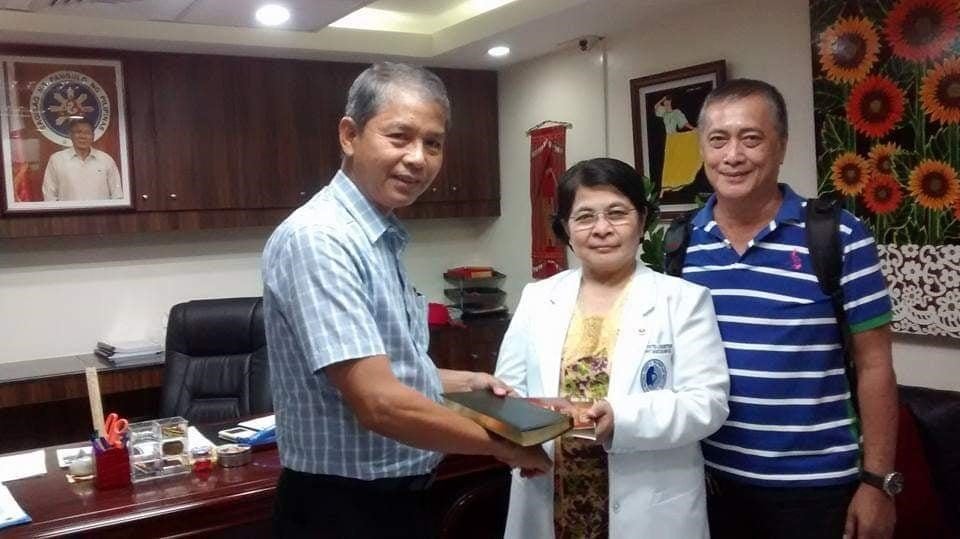
Fig. 3 Pastor Gerry and Nomer Armamento of the hospital ministry gave a Bible to Dr. Rose Marie Rosete-Liquete as a present when she became NKTI Executive Director, 2019
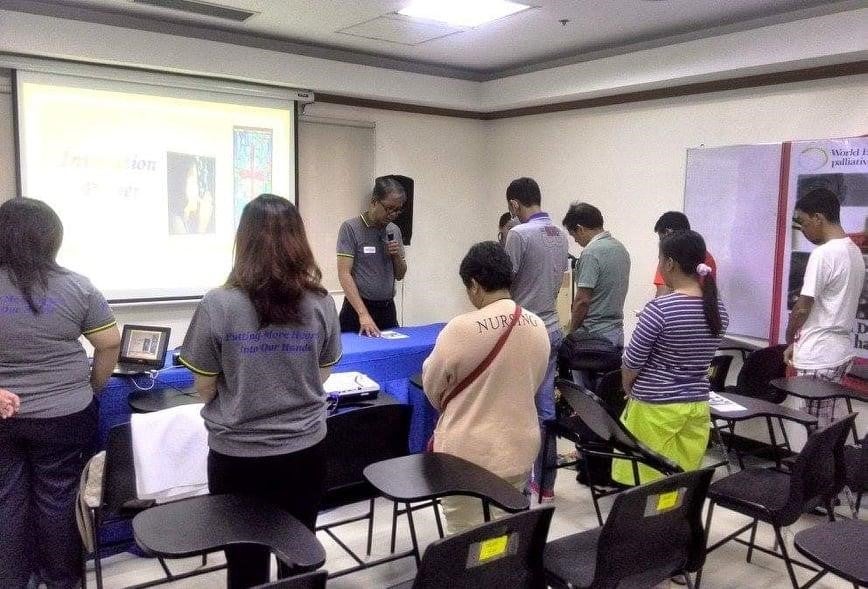
Fig. 4 Before the COVID-19 pandemic, workers can still attend a church service held inside a lecture room in the hospital before or after they work on a Sunday. Photo: GFC, 2019
In 2014, my parents’ informal bible-study group at the National Kidney and Transplant Institute (NKTI), a government hospital in Metro Manila, became somewhat official when my father joined its Palliative Care Unit. As described by the World Health Organization, palliative care “improves the quality of life of patients and their families facing the problem associated with life-threatening illness, through the prevention and relief of suffering by means of early identification and impeccable assessment and treatment of pain and other problems, physical, psychosocial and spiritual.”
Palliative Care in Manila Hospitals
Palliative care was first introduced in the Philippines for cancer patients, with a focus on the relief of cancer pain. Through the years, palliative care has been recognized as a public health service and an integral component of care and support for all patients stricken with cancer, End-Stage Renal Disease (ESRD), advanced heart/ liver/ respiratory diseases, dementia, and AIDS. A substantial percentage of the patients admitted at the NKTI are ESRD cases and they experience significant chronic symptoms and burdens that are comparable to patients suffering from advanced forms of cancer. These patients spend a longer time in the hospital and in most cases require intensive spiritual counselling.
In the Palliative Care Unit, my father serves as both spiritual advisor to the doctors and pastor to the sick and dying faithful afflicted with ESRD, who notwithstanding the Catholic majority at the hospital, also includes a good share of patients from Protestant denominations. His services, though, are often requested by Roman Catholics and even atheists.
Aside from week-day Bible study sessions for health workers, he has been ministering to a small congregation composed mostly of transplant and dialysis patients, who have asked him to hold Sunday Service in one of the hospital's lecture rooms. The task proved to be logistically difficult because unlike Catholic masses held in a dedicated chapel within hospital grounds, the assigned lecture rooms for other religious affiliations move from one wing to another, depending on the availability of meeting spaces.
My father does not receive a salary from the hospital nor does he charge a fee for his services to the patients. His work is entirely supported by the Palliative Care Unit’s bible-study group membership, made up mostly of doctors, hospital workers, current and former patients.
Religious communities providing social services
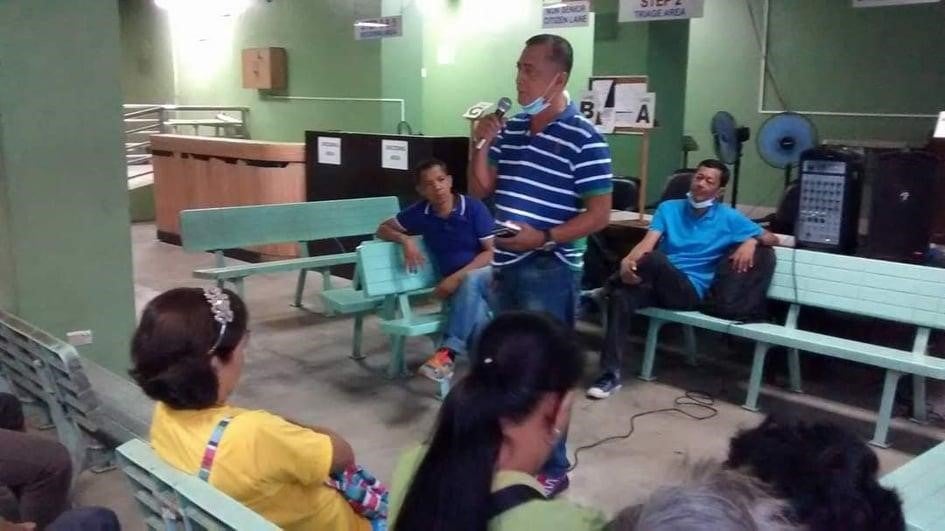
Fig. 5 Nomer Armamento, a member of the microchurch at NKTI reaches out to fellow patients with encouraging testimonies of healing as they wait for treatment. Photo: GFC, 2019
My father’s microchurch at NKTI helps other patients in need of financial assistance. They organize and split the cost of maintenance medicine and write letters of endorsement to charity organizations. In special cases, the congregation does the legwork to reduce hospital bills of indigent patients, making the rounds for handouts from the nearby offices of politicians and several government agencies. In effect, members of the ministry have been delivering the kind of social services that the Duterte government has been unable to provide the poor and sick.
My parents also made themselves available for at-home visits as well as through social media contact; and recently though socially distant private worship. Every week, my father posts the outline of his sermons on his Facebook account, whereas my mother posts the video recordings of his worship services which my father conducts at home, in their garage.
My sister also accompanies my father as he visits patients in their homes. These would often include not just short bible study and “praying over” sessions but also the prescription of medicine and administration of flu shots.
“In our (Facebook messenger) group we pray for all patients and their families, including doctors and other frontliners at NKTI. They only go to the hospital now for checkups because COVID-positive patients are being treated in NKTI. The front line workers use the messenger (group) to share their concerns, fears, and reports when someone turns negative in their swab test.”
Because of a strict code of ethics, Gerry cannot photograph or record himself tending to patients, but a seven-minute documentary by Malu Maniquis details the activities of front line workers at the same hospital where my parents conduct their ministry. Maniquis describes the NKTI, which had set up tents in their former parking lots, as “a war zone”. Her immersion made her realize “the gravity of the situation” that often remains abstracted by statistics and overwhelmed by political issues. She notes how in their protective suits and face masks “everyone looks almost the same.” Protocols in this pandemic have greatly anonymized healthcare professionals. Priests and pastors therefore had to wear the same protective gear worn by health workers if they visited patients.
The Congregation helped me at my time of need
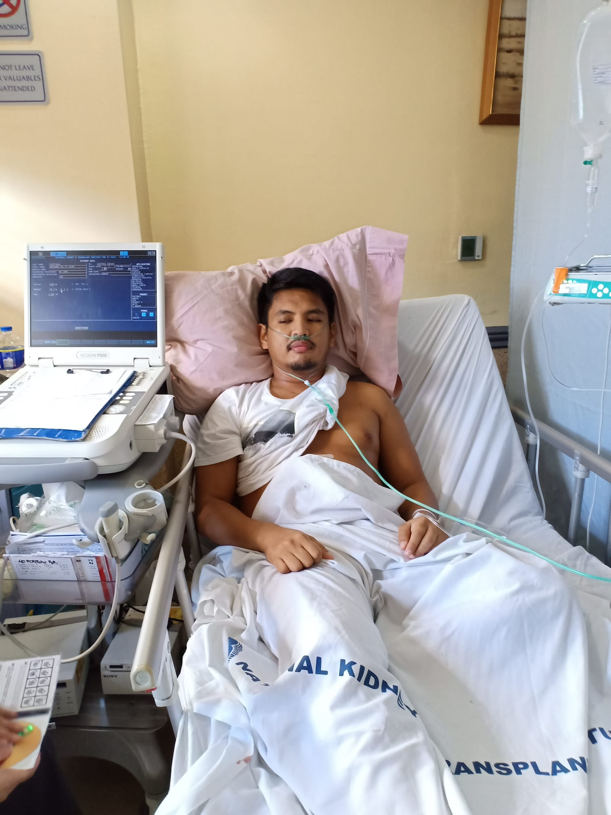
Fig. 6 I was hospitalized for pneumonia and underwent surgery in early 2019 at NKTI
I can also offer a personal account of how religion and healthcare intersected even before the COVID-19 outbreak, as I was admitted to the NKTI when I contracted pneumonia, which was complicated by the enlargement of my internal organs. I was endorsed for surgery by Dr. Ernesto Que, head of the endoscopy unit, whose wife, also a doctor, attends the weekday bible-study sessions in the hospital.
As a graduate student relying on government insurance, which only partially covered my hospital bill, I worried because I could not afford the expensive medical procedures which I would have to pay for out of pocket.
After the surgery, I stayed for 12 days in a ward where I was visited by members of my parent’s tightly-knit congregation. I rarely attended church service so it was the first time I got to spend a significant amount of time with them. As I recall, at least three of them were doctors who held positions in the administration of the hospital and others were student doctors. Still others were nurses, janitors, cashiers, and orderlies in the hospital.
The bulk of the visits came from former patients who made it their mission to comfort other patients going through the same ordeals. Among them were Nomer, Romel, and Edgar, who performed missionary work even as they themselves were still receiving maintenance treatment for their organ transplants. They volunteered to process my papers for the Medical Assistance Program of the Philippine Charity Sweepstakes Office (PCSO).
Most Filipinos would normally call the kind of life-saving favors that I received from my father’s congregation as “utang na loob,” which roughly translates as “debt of gratitude.” But I haven’t heard a single person in the congregation use this term to describe what they have done for me.
Microchurches
Microchurches, such as my father’s congregation, are a sign that organized religion, like the state, has failed the population. Unlike established churches, both Catholic and Protestant, microchurches are more fluid and ad-hoc in their existence, arising out of local realities affecting a particular community. In the case of the microchurch based at the NKTI, “ministering to the sick” includes guiding the faithful through the labyrinthine landscape of the Philippine healthcare infrastructure, and when necessary, finding charities and loose arrangements of mutual aid to assist the indigent. In short, they are providing essential social services in the face of the failure of the government to provide an adequate safety net for the poor during the health crisis.
My hospitalization was the first time I was immersed in the religious aspect of healthcare, which my parents' congregation revealed to me in intimate detail. I was also oriented in the field of palliative care, hearing stories of patients who requested pastoral ministry during their last moments in the hospital. I was particularly struck by the story of a university professor who had also been the son of a pastor but has been an atheist for most of his life. My father ministered to him during his last days, often debating about the existence of God and the truth of the Bible. Before he passed away, he sent a greeting card to my father thanking him and saying he was “at peace”.
Religion and medicine need not be at odds
Recent developments in modern medicine have allowed an interface between spirituality, quality of life, and mental health. And there are numerous cases that can illustrate the essential role of religion and spirituality in the caregiving of patients with terminal illnesses and chronic medical conditions. For example, when terminal patients are given a finite number of months to live, they are often referred to palliative care to help not only the patient but their family prepare for the inevitable through various stages of counselling and bereavement assistance.
This need to aid medicine with psychological well-being is the reason why ministers in palliative care units remain or have a resurgent role in modern hospitals. Even before the coronavirus lockdown, many patients suffered from depression and isolation, with a good number of them coming from faraway provinces in hopes of gaining access to the state-of-the art medical facilities at NKTI.
When I asked my father why he has given up serving as a Pastor for a traditional church to perform missionary work in hospitals full time, he recalled the account of Jesus going to funerals and attending to the sick and dying in the gospel, and he adds, that even in the moment of death, Jesus was reassuring the penitent thief that “I will be with you in Paradise.” My father added that it was important to station himself near the flock at that moment when they most need spiritual counselling.
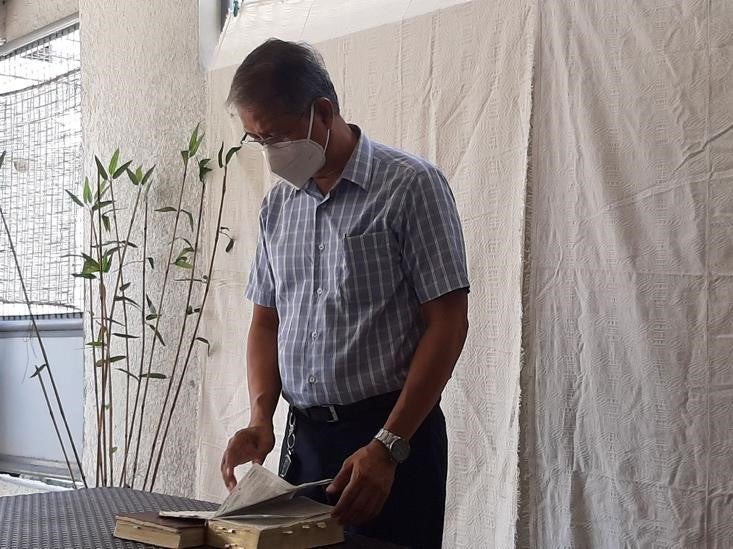
Fig. 7 Under coronavirus lockdown, sermons are recorded in the garage and sent to members of the congregation and patients of palliative care. Photo: GFC, July 2020Ministering and COVID-19
At the time of writing, the Philippines has 50,359 confirmed cases and 1,314 COVID-related deaths, while 12, 588 have reportedly recovered from the illness. At least 21 doctors fighting at the frontline have died as of May 2020. This puts the country, which has not conducted mass testing and contact tracing, the second hardest hit by COVID-19 in Southeast Asia.
Since this pandemic has required patients to be kept in isolation and barred from visiting even by close members of their families, many Filipinos have had to learn of the death of their loved ones through official announcements. A public health protocol requires patients who died from symptoms of COVID-19 infection to go straight to the crematorium. The inability to find closure and hold proper funeral services amidst the lockdown are part of the anxieties that have pushed nations into a mental health crisis.
My father’s work at the NKTI, the spiritual community that has formed around the hospital’s Palliative Care unit and my own experience with this congregation, leave us with some insights about the relationship between microchurches, medicine and palliative care in the face of COVID-19: that the spiritual side of palliative care is especially needed and that microchurches step into the vacuum left by both struggling states and organized religion. Some microchurches, like my father's, demonstrate the resourcefulness and adaptability required of civil society in times of crisis. Loose, faith-based interpersonal arrangements deliver the safety net the weakest members of society need and require. The downside of all of this, however, is that these arrangements let the state off the hook. People deserve decent healthcare, including palliative care, not as a gift of charity but as their right as members of a truly functioning society. But in the case of failed societies with failed states, microchurches may be the best-case scenario.
Microchurches are successful at reaching out to a growing population of non-affiliated protestants and nominal Catholics, many of whom are disgruntled with large organized religion. However, other denominations are largely left out of hospital policy-making; or at best, included as an afterthought. As such, there was little to no infrastructure allocated to them at the onset of the COVID-19 pandemic.
Since COVID-19 cases at the NKTI became critically high, my father who is now a senior citizen, has been unable to visit patients in the hospital. He continues to reach out to them and their families stricken with grief, sending them recordings as he reads through verses from the Bible to patients. In one of his messages he quotes extensively from the Psalm of King David: “Yea, though I walk through the valley of the shadow of death/ I will fear no evil: for thou art with me; thy rod and thy staff they comfort me...”
Geronimo Cristobal is a Filipino writer taking up an MFA in Art Criticism from the School of Visual Arts in New York. He will join the American Studies program at Columbia University in 2021. Instagram: @geronimocristobal
Disclaimer: The views and opinions expressed in this article are those of the authors and do not necessarily reflect the position of the blog editorial team or the Asia Research Institute.
South Asia | Southeast Asia | East Asia | Other Places | Hinduism | Buddhism | Islam | Christianity | Other Religions



